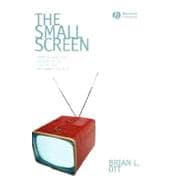
What is included with this book?
| Preface | |
| Television and Social Change | |
| The Times, They Are a Changin | |
| Shifting Paradigms | |
| Naming the New Paradigm | |
| The Information Age | |
| Change and Social Anxiety | |
| Symbolic Forms as Equipments for Living | |
| Terminisitic Screens | |
| Television as Public Discourse | |
| Ubiquity and Centrality | |
| Thinking Like Your TV | |
| The Basic Attitudes of Yes and No | |
| Postmodern Screens | |
| A Theoretical Approach to Television Genres | |
| Content and Form | |
| Television as Symbolic System | |
| Cultural Trends of the 1990s | |
| Life in the Information Age | |
| The Information Explosion | |
| Semiotic Excess | |
| What is Information? | |
| Decentering Production | |
| From Printed Words to Electronic Images | |
| Information Storage, Retrieval, and Circulation | |
| Society through the Lens of Techno-Capitalism | |
| Rapid Adoption of the New Information Technologies | |
| The De-Massification of Media | |
| An Altered Sense of Time and Space | |
| From Goods Production to Information Services | |
| From Fordism to Flexible Accumulation | |
| From Nation-State to Globalization | |
| Social Anxieties of the Information Age | |
| Overload or Feeling Swamped | |
| Adrift or Feeling Placeless | |
| Apathy or Feeling Guilty | |
| Acceleration or Feeling Left Behind | |
| Fragmentation or Feeling Divided | |
| Hyperconscious Television | |
| Embracing 'the Future ': The Attitude of Yes | |
| Characteristics of Hyperconscious Television | |
| Eclecticism: Hybridity and Stylistic Pastiche | |
| Intertextuality: Allusion and Appropriation | |
| Self-Reflexivity: Irony and Cynicism | |
| The Simpsons as Exemplar | |
| Breaking the Rules at FOX | |
| A Legendary History | |
| "The Simpsons 138th Episode Spectacular "Symbolic Equipments in Hyperconscious TV | |
| Ways of Being | |
| Performance and Personae | |
| Ways of Knowing | |
| The Logic of PO | |
| Provocation | |
| Provisionality | |
| Prosumption | |
| Nostalgia Television | |
| Celebrating 'the Past ': The Attitude of No | |
| Characteristics of Nostalgia Television | |
| Purity: Simplicity and Spirituality | |
| Unity: Narrative and Community | |
| Security: Authenticity and Sincerity | |
| Dr. Quinn Medicine Woman as Exemplar | |
| Reproducing the Rules at CBS | |
| Life in the Old West | |
| "Colorado 's Woman of the Year "Symbolic Equipments in Nostalgia TV4 | |
| Ways of Being | |
| Construction and Core Being | |
| Ways of Knowing | |
| The Logic of SO | |
| Consequently | |
| Closure | |
| Consumption | |
| Television and the Future(Re)Viewing The Small Screen | |
| Two Voices | |
| Textuality | |
| Ontology | |
| Epistemology | |
| The Digital DivideLife and Television in the Twenty-First Century | |
| Meeting Conflicting Needs | |
| Hyperreality TV | |
| Reality TV | |
| Technological Convergence | |
| Interactivity | |
| Mobility | |
| The Next Great Paradigm Shift? | |
| The Coming Conceptual Age | |
| New Anxieties and Equipments | |
| References | |
| Index | |
| Table of Contents provided by Publisher. All Rights Reserved. |
The New copy of this book will include any supplemental materials advertised. Please check the title of the book to determine if it should include any access cards, study guides, lab manuals, CDs, etc.
The Used, Rental and eBook copies of this book are not guaranteed to include any supplemental materials. Typically, only the book itself is included. This is true even if the title states it includes any access cards, study guides, lab manuals, CDs, etc.